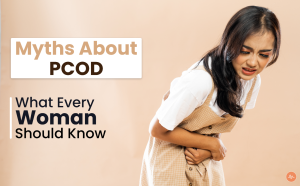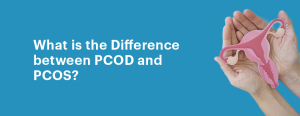
Breaking the Myths About PCOD: What Every Woman Should Know
A considerable portion of women of reproductive age are afflicted with PCOD, a hormonal illness that is still poorly understood. To properly diagnose, treat, and support PCOD, it is essential to know the facts. By posting important facts that every woman should know and busting common fallacies, we hope to educate readers on a daily basis.
Myth 1: PCOD affects only women who are overweight

A widely held misconception regarding PCOD is that it exclusively impacts overweight women. Although weight gain is a common symptom of PCOD in many women, PCOD affects individuals with various body shapes. The illness develops as a result of a combination of factors, including hormone abnormalities, heredity, and lifestyle decisions. It is important to understand that PCOD does not discriminate based on size because it can affect women who have healthy weight as well.
Myth 2: PCOS and PCOD are the same

Although Polycystic Ovary Syndrome (PCOS) and PCOD are sometimes used synonymously, they are distinct conditions. Although PCOD is thought to be a lesser version of the condition, it is distinguished by the presence of ovarian cysts. On the other hand, PCOS is associated with more severe hormonal abnormalities and has been linked to a number of health issues, including diabetes and heart disease. Effective management and treatment of these two illnesses depend on an understanding of their differences.
Myth 3: If you have PCOD, you can’t get pregnant

One common misconception is that PCOD-affected women are infertile. For those who are impacted, this misunderstanding may cause feelings of pessimism and despair. It is a fact that a large number of women with PCOD are able to conceive successfully. Changes in lifestyle, medical intervention, and fertility support can significantly increase the likelihood of pregnancy, even though hormonal abnormalities may impact ovulation. Women who are having trouble getting pregnant should speak with medical specialists who can provide individualized advice and support.
Myth 4: It’s an Uncommon Illness
It’s a common misconception that PCOD is an uncommon illness, however, this is untrue. Research suggests that 10% of women who are of reproductive age suffer from PCOD. Although there is now more knowledge on PCOD in North America, there is still a great deal to learn about its symptoms and effects. In order to promote supportive communities and encourage women to seek medical attention, education and awareness are essential.
Myth 5: Medication is the Cure for PCOD
A prevalent misconception is that PCOD can be resolved with medication. There is presently no known cure for PCOD, despite the fact that a number of therapies, including hormonal contraceptives, insulin-sensitizing medications, and anti-androgens, can help control the symptoms. A comprehensive strategy that incorporates medication, lifestyle changes, and routine healthcare professional monitoring is frequently necessary for effective management. Women and doctors should collaborate closely to create a customized plan that targets the individual’s symptoms and health objectives.
Myth 6: Women Who Suffer from PCOD Cannot Work Out

Despite what is often believed, exercise is not only helpful but also necessary for women with PCOD. Frequent exercise enhances insulin sensitivity, helps control weight, and regulates menstrual cycles. Walking, swimming, and yoga are examples of exercises that can improve one’s physical and mental health. Exercise can also improve mood and ease some of the emotional difficulties related to PCOD.
Myth 7: PCOD Is Not Affected by Diet

There is a common misperception among women that their food has minimal effect on PCOD, however. Studies show that diet decisions are very important in controlling PCOD symptoms. Lean proteins, fruits, vegetables, whole grains, and other nutrients make up a balanced diet that can help control insulin levels and enhance general health. Reducing sugar and refined carbohydrates consumption can improve metabolic health and reduce symptoms. Seeking advice from a nutritionist might yield customized food suggestions based on each person’s requirements.
In summary
It’s critical to dispel the myths around PCOD so that women may take charge of their health and feel empowered. Acknowledging the impact of lifestyle choices, distinguishing PCOD from PCOS, and realizing that PCOD can affect women of all sizes are essential steps in raising awareness and encouraging improved health outcomes.
Women should never be afraid to ask for medical guidance and assistance, and it can be quite helpful to connect with people who have gone through similar things. Together, let’s dispel the stigma associated with PCOD and build an informed, encouraging community for all women.